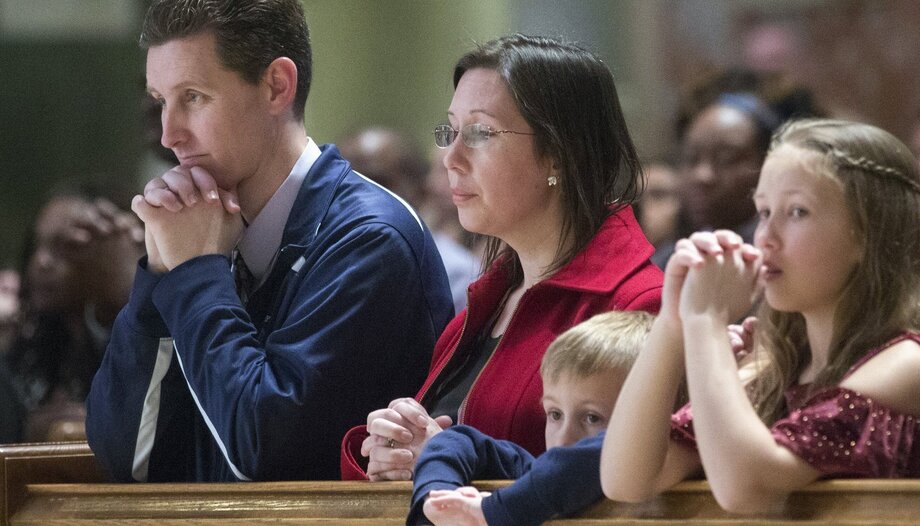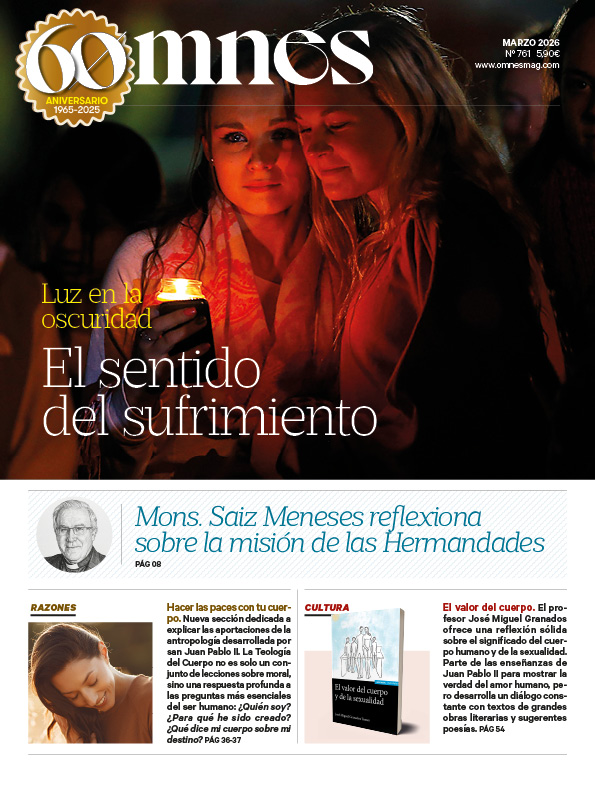There is no doubt that we find ourselves in a difficult cultural and social moment for the transmission of the faith in general. Today's culture increasingly leaves aside the anthropological vision of man, where interiority is important, and in social relations the material (what one has, what one produces) takes precedence over the immaterial: who you are, what your dreams and projects are, what makes you happy....
A profoundly materialistic society and culture is compounded by people's inability to think. The loss of values, relativism, the lack of humanistic training in general, technological evolution, the acceleration of the pace of life or social polarization are some of the causes.
In this complex context, it is normal that as a society we have been drifting towards a culture of rapid response where there is almost no room for reflection and dialogue.
And yet in such relevant topics as the transmission of faith, education in values or human formation in general, time, dialogue and reflection are essential.
Researcher and writer Catherine L'Ecuyer, an expert in psychology and education, in the book that made her famous, Educating in awe, speaks of the convenience of children coming into contact with nature, because there they discover and experience the silence, the slow growth of plants, the slow walking of ants or the careful pollination of flowers in spring.
What L'Ecuyer says has a great deal to do with the process of transmitting the faith to our children: when we talk about God to our children or pray with them, we are "sowing" in them small seeds in their hearts, something that undoubtedly requires time and care.
Faced with a social panorama that is not free of obstacles, faith, which fulfills every person's desire for transcendence, can be sown in fertile soil, if we know where and when to sow the seed.
Parents, interpreters of the world for their children
In opening the door to dialogue with transcendence for our children, we parents have a certain advantage: our children, especially in their first years of life, are naturally open to whatever we want to show and teach them. They make us their interpreters of the world. From the age of "why", around the age of 3, our children want to understand what surrounds them and they come to us precisely because we are their parents.
It could be objected, not without reason, that we cease to be true interpreters when our children reach adolescence, and yet, also at that stage, what we say to them is important together with the example we set for them.
It's true that adolescents are always dissenting from our interpretation of the world, and this is a good thing: our teenagers are beginning to develop their own thoughts and it is therefore quite logical that they do not simply accept what we tell them, but that they reflect and develop on their own.
However, following the saying: "two don't argue if one doesn't want to", parents, at this stage, are very necessary for them to elaborate their conception of life and the world; without our interpretation of the world, they would have no one to talk to, no one to talk to, and no one to talk to. against who confronting each other.
In this sense, we should ask ourselves what interpretation we want to give them: how we look at the world and people will necessarily influence them.
If our outlook is pessimistic, they will also have a pessimistic conception of what surrounds them and, even worse, they will distrust the people around them; if our outlook is, on the contrary, positive and hopeful, they will also be able to see the positive in difficulties, they will see opportunities for growth in crises, they will be able to see the Good in the midst of so much evil.
Faith from freedom
As I have already said, the fact that we parents are interpreters of the world for our children does not mean that they will accept our vision just like that, and here we enter into another essential point in the transmission of faith: freedom. The transmission of faith requires freedom. It is useless for us to try to impose it: it will not find fertile ground on which to cling.
We parents must count on the freedom of our children when we speak to them about God, because it is they themselves who have to experience Him, we cannot experiment for them. We can transmit to them how much faith has helped us in our own difficulties, in the pains we have had, in the crises we have gone through, and thus show them how nothing has really prepared us for God's presence in our lives. in full to face life's disagreements.
In a meeting on faith that I attended, the famous Roman priest Fabio Rosini said: "I have never been to a meeting on faith.Many times we think that faith depends on us, on what we do: "I have to have more faith to face this problem" or "I have to pray more or make this or that sacrifice" thinking that perhaps God will reward us with more or less faith according to how we have behaved. No, in that sense, faith is given by God, but how does our faith grow then?
And he continued: "When we take advantage of the occasions that He allows, to trust in Him. God increases your faith from your problems - and frailties - if you let Him, that is, if you take advantage of those difficulties to lean on Him. It is God who gives us faith but man has to be willing to accept it."
It seemed to me a necessary reflection: faith becomes, then, not a set of contents and dogmas but an experience, a letting God do, a leaning on Him when the legs falter.
It is absurd to think of leaning on God when difficult moments arrive if we do not establish a personal relationship with Him beforehand.
Sowing deep in the heart
All of the above corresponds to a dimension of the transmission of faith that we could call "active", where we parents manage to sow that faith in their young hearts.
Sometimes it will be the devotion to the Sacred Heart of Jesusa family visit to the cemetery on All Saints' Day; a daily offering to Our Lady, prayers before bedtime recited with great attention, teaching them to recite the Rosary...
Obviously, the more seeds we sow, the more likely it is that faith will take hold in the soil. On the other hand, as our children grow, that seed can be something more intellectual: it can be teaching them that there is something beyond the material, that we must always do good and love and respect everyone, that God loves them like a mother and a father, that he cares for them, that he protects them.
Our role, in short, is to open a door to faith as an experience of God, which is both an instrument on which to rely and a source of happiness, because we cannot forget that our relationship with God gives meaning to our existence: feeling that we are his children fills our lives with color, strength, self-esteem and purpose.
The seed that we can sow must take root in the hearts of our children, not in their behavior. To put the focus of the transmission of faith on external behaviors is in a way equivalent to saying that faith is only something external: a series of things to do in order to feel satisfied and to make God "happy" with us.
The parable of the sower speaks of this superficial sowing: "(...) some of the seed fell by the roadside, and the birds came and ate it up. Another part fell among the stones, where there was not much earth, and soon sprouted, because the earth was not deep; but as soon as the sun rose, it was burned and withered, because it had no root."
Faith must be "buried" in the deepest part of our children's hearts, where they are formed as persons and where they unconsciously store memories and experiences that shape their innermost being and from where they will draw water as adolescents or adults when they feel the aridity of the world and its difficulties.
As Pope Francis wrote in his latest encyclical, Dilexit us, to speak to the heart is "point to where each person, of all kinds and conditions, makes his or her synthesis; where concrete beings have the source and root of all their other powers, convictions, passions, choices, etc.."
Saying without saying
The second dimension of the transmission of faith to children, which we will call the "passive" dimension, has much to do with the example we give, because children watch everything we do and are able to grasp the depth of our actions.
In this dimension, we parents will tell without telling, we will show our children how and with what intensity we pray and live our faith. This dimension is undoubtedly the most important because what is the point of telling stories of Jesus' life to our children if we do not bring the Gospel to life? How will they learn to pray if they do not see us do it? How will they understand that our relationship with God is our strength if we do not show it to them?
I remember that once, when I was 21 years old, I confided to my father a situation that was causing me a lot of anguish. He, after listening to me, did not propose a solution to the problem, but told me about a complicated situation at work that made him suffer and told me how he prayed and how he spoke to God about that difficulty. His words touched my heart and I still remember them many times today and they help me to pray.
Like this anecdote, I could tell many others. For parents, reaching the hearts of our children should not be so difficult. What helped me from what my father told me that day was not the situation he was going through or knowing that my father is a person of faith who prayed for the situation to be resolved. What helped me was that my father opened his intimacy to me and showed me his fragility and how he was leaning on God from that fragility of his. What my father did that day was to let me see a little piece of his relationship with God, a relationship that I understood to be real, strong, deep, virile.
And yet, there is nothing more powerful than a mother or father who speaks to their children from their most intimate experience, even if it reveals them in all their nakedness.
It would definitely be worse for our children to perceive that we block our intimacy -also spiritual- behind a wall and from which we only show what is good and right in our actions. Is that what we want our children to perceive of us: perfect parents who do not make mistakes, who are clear about everything and whose faith does not waver?








